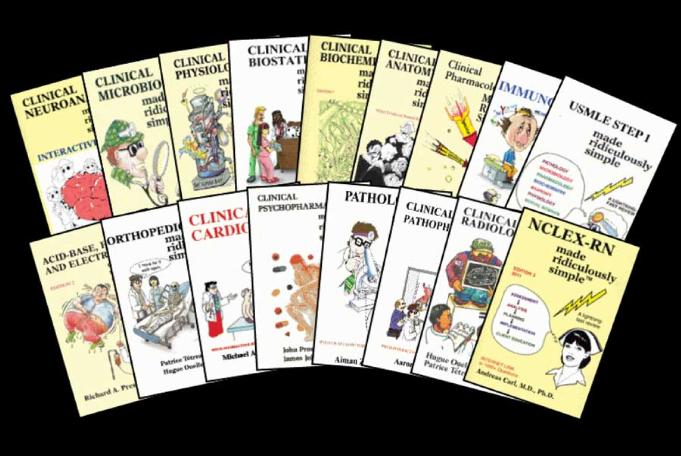 I am not a programmer. I am an educator and I have used many programming languages – going back to HyperCard – for their short learning curves, power, and ease of use. Over the years, I’ve used LiveCode to create many educational applications for the university and my publishing company, Medmaster. LiveCode has been enormously useful to create apps for Windows and Macintosh. For instance, the app “Atlas of Human Diseases,” which describes in pictures and text over 11,000 diseases in the world, could take a lifetime to do as a book, but it required only a few days with LiveCode.
I am not a programmer. I am an educator and I have used many programming languages – going back to HyperCard – for their short learning curves, power, and ease of use. Over the years, I’ve used LiveCode to create many educational applications for the university and my publishing company, Medmaster. LiveCode has been enormously useful to create apps for Windows and Macintosh. For instance, the app “Atlas of Human Diseases,” which describes in pictures and text over 11,000 diseases in the world, could take a lifetime to do as a book, but it required only a few days with LiveCode.
Medmaster’s focus has been the development of brief books for students that quickly show overall concepts with understanding. LiveCode has added interactivity through CDs accompanying the books or downloadable applications for Mac and Windows.
It was relatively easy for me to learn LiveCode because of my background with HyperCard, but it may not be so easy for a beginner with little computer programming background. While HyperCard had only about 150 scripting words, LiveCode has over 2000, with the number growing as LiveCode advances. There needs to be a brief, linear, getting-started book that makes it easy for those with little programming background to learn LiveCode.
I, therefore, wrote “LiveCode Lite: Computer Programming Made Ridiculously Simple” (available as a free PDF download from Medmaster), which focuses on 150 or so most useful LiveCode programming words (in my experience) and how to use them, as well as the LiveCode interface, to help the beginner get started and create an enormous variety of applications with this information alone.
As LiveCode continues to advance to higher versions and applications for mobile devices, the language and interface also continue to expand. My book is written at the level of LiveCode 5.5.3, (which I have found particularly stable). LiveCode is now up to version 8 and extends into mobile apps, which my book does not cover. However, in order to develop mobile apps, it is important to start with a basic background in LiveCode, which the book provides.
The book now needs expansion that includes mobile apps and the new LiveCode versions as they advance, describing:
- How is the LiveCode interface changing?
- Which of the basic original LiveCode script words are not applicable to mobile devices or to the latest LiveCode versions?
- What new basic script words have been added that apply specifically to mobile devices and the new LiveCode versions? The focus needs to be on the most important words to know and how to use them, so that the user can grasp the overall picture without getting lost in detail.
Since I have not programmed for mobile devices, I welcome other contributors to help extend the book in that area, as well as updating the language for newer LiveCode versions as they advance.
Got ideas? Want to help Stephen extend his book? Get in touch in the comments below!
Stephen Goldberg, MD is a Professor Emeritus of the University of Miami Miller School of Medicine. He is also the President of the Medmaster Publishing Co.


4 comments
Join the conversationMark Frederiksen - October 16, 2015
I would like to join you, and others, during the summer of 2016 to expand your LiveCode Lite book as you described (see below). I would be interested in working on the mobile related sections. I will contact you via your MedMaster e-mail address.
iF and when a 2016 LiveCode conference is announced — https://livecode.com/conference/ — we could possibly meet then.
>>
The book [LiveCode Lite] now needs expansion that includes mobile apps and the new LiveCode versions as they advance, describing:
How is the LiveCode interface changing?
Which of the basic original LiveCode script words are not applicable to mobile devices or to the latest LiveCode versions?
What new basic script words have been added that apply specifically to mobile devices and the new LiveCode versions? The focus needs to be on the most important words to know and how to use them, so that the user can grasp the overall picture without getting lost in detail.
Since I have not programmed for mobile devices, I welcome other contributors to help extend the book in that area, as well as updating the language for newer LiveCode versions as they advance.
<<
Stephen Goldberg - October 16, 2015
Thank you. I’ll be glad to get together with you, as well as with other interested contributors. With expansion, I think the book should draw in a significant number of new LiveCode users.
Robert (Bob) Earp - October 17, 2015
Stephen, great idea and great book, thanks for taking the time to put it together. I haven’t completely read through your book yet (sorry), but I very much like what I see especially as I’m currently into teaching my grandkids how to code. You may have covered off what follows, but I thought I’d send it while fresh in my mind.
Being so old (I started off in flight simulation prior to their being any digital computers), I find that a lot of the basics get pushed aside in the interest of “enhanced features” that I suspect very few have an interest in. I’ve often wondered what falls under the bell curve for LC scripting words vs how they are used in the most powerful way. Bigger is not always better as I’m sure you agree…
In that vein, getting folks to structure their code in an efficient, logical and understandable manner so that even the original author can understand when they go back to fix or enhance things after a while, is a value often overlooked. If people follow a few basic guidelines such as naming conventions, the best location of a handler and the like, life becomes much easier.
Way back, Richard Gaskin and I, and others, put together some (hopefully) helpful notes, and I’d be happy to share them with you if the subject would be of interest. I’m sure Richard would too.
Kind regards, Bob…
Stephen Goldberg - October 22, 2015
Thanks for your thoughts Bob. I’d be interested in reviewing your notes, as you mention.